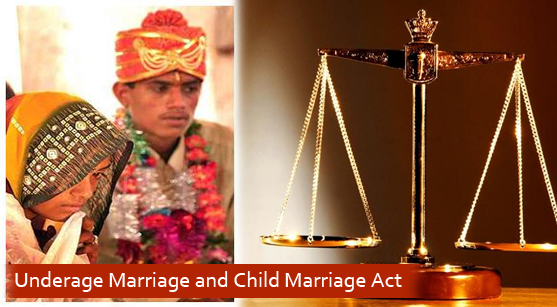Child Marriage Act prohibition was enacted in 2006 and was made effective throughout the country from 1st November, 2007. Legality of under age marriage according to UNICEF is said to be before the child attains the age of 18 years and it is regarded to be human right violation. Child marriage is a long standing issue in the country due to its having root in cultural, religious and traditional protection, which makes it tough battle to fight. Girls, more than 1.5 million, under 15 years of age were married according to 2001 census. Several harmful consequences of child marriages are the child losing opportunity to be further educated, segregation from friends and family, early pregnancy, health risks, sexual exploitation, child becoming vulnerable towards domestic violence, low weight babies, high infant mortality rate, pre-mature birth, etc.
Objective of the Act
This Act was enacted to prohibit child marriage along with incidental and connected matters. For ensuring that this type of marriage is eradicated completely from the society, the Indian government had enacted the Child Marriage Prevention Act in 2006. This Act is said to be armed with providing provisions for prohibiting child marriage, providing relief and protecting victims and increasing punishments to those who abet, solemnize or promote such marriage. Also, the Act calls for the appointment of Prohibition Officer to implement the Act.
More about this Act
Structure
It comprises of 21 sections and extends all over the country, with the exception being J&K and that of the Pondicherry Union Territory.
Section 2 of this Act comprises of:
- The Child: A person who is yet to complete 21 years of age if male, and if female, it is 18 years.
- Contracting party: Any of the party whose marriage is to be solemnized.
- Minor: An individual who presently does not fall under Majority Act.
- Child Marriage: The marriage in which any of the party to it is a child.
- Voidable marriage: According to the law, all child marriages are voidable on the choice of contracting party having child during marriage solemnization. Nullity decree could be obtained before District Court by filing petition for marriage annulment within two years of attaining majority. The district court, when granting decree would make an order to direct both the parties, along with parents and guardians for returning to other party, any money, ornaments, gold, gifts along with other valuables.
Punishment and offences under this Act
- For male adult: In case, adult above 18 years contracts child marriage, there would be rigorous imprisonment for about two years or fine of Rs. 1 lakh or both.
- For solemnizing marriage: In case a person conducts, performs, abets or directs child marriage, 2 year rigorous imprisonment and fine of Rs. 1 lakh.
- For permitting / promoting marriage solemnization: Person in charge of child, be it guardian, parent or any one, trying to promote child marriage or even participates or attends such marriage is punishable with 2 years rigorous imprisonment or fine of Rs. 1 lakh.
The qualified advocate can help to determine the legality of under age marriage and help the parties to be informed about this and to take the right decision.
Author’s Bio: The author is currently associated with advocateinchandigarh. and writes articles for legal sites on a continuous basis, providing valuable information on the different sections of law.

